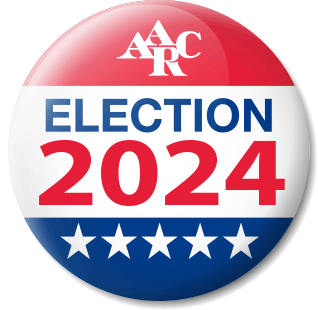President-Elect
Dana Evans
Midwest Region Respiratory Care Director
Advocate Healthcare
Member Since: 1999
AARC Activities:
- AARC Board of Directors, Director at Large, 2018 – Present
- Advance Practice Respiratory Therapist Committee, 2016 – Present
- Program Committee 2018 – Present (Chair-Elect – 2022, Chair – 2023)
- AARC Core Brand Team, 2023
- Elections Committee, 2018 – 2022
- Finance Committee, 2016 – 2019
- Sub-Audit Committee, 2016 – 2019
- Leadership and Management Section, 2012 – present
- Neonatal and Pediatric Section, 2002 – present
- AARC Specialty Practitioner of the Year – Management Section, 2013
- AARC Fellow – 2022
House of Delegates Activities:
- Delegate, Missouri Society for Respiratory Care, 2013 – 2016
- House of Delegates Treasurer, 2016 – 2018
- Delegate Assistance Committee, House officer liaison, 2016 – 2018
- Professional Mentorship and Volunteerism, House officer liaison, 2016 – 2018
- Student Mentorship Committee, House officer liaison, 2016 – 2018
- Student Mentorship Committee, 2012 – 2016 (Co-Chair 2013-2016)
- Scrutinizing Committee, 2013 – 2016
Affiliate Activities:
- Vice President-Elect, Missouri Society for Respiratory Care, 2009 – 2010, 2011 – 2012
- Vice President, Missouri Society for Respiratory Care, 2010 – 2011, 2012 – 2013
- Delegate, Missouri Society for Respiratory Care, 2013 – 2016
- Director at Large, Missouri Society for Respiratory Care, 2011
- District III Vice-President, Missouri Society for Respiratory Care, 2007 – 2009
- Chair, Education Committee, Missouri Society for Respiratory Care, 2006 – 2016
- Co-Chair, Annual State Conference Planning Committee, Missouri Society for Respiratory Care, 2009 – 2013
- Chair, Professional Education Grant, Missouri Society for Respiratory Care, 2007 – 2016
- Chair, Glen Kolander Memorial Leadership Award, Missouri Society for Respiratory Care, 2012 – 2016
- Co-Chair, Fall Symposium Specialty Conference Neonatal and Pediatric Section, Missouri Society for Respiratory Care, 2014
- Missouri Society for Respiratory Care, Craig A. Ziegelbein Service Award, 2012
- Missouri Society for Respiratory Care, Presidents Recognition Award, 2011 and 2012
Related Organizations:
- American College of Healthcare Executives
- Member, Chicago Healthcare Forum Membership and Advancement Committee, 2022 – Present
- Question Writer, American College of Healthcare Executives Board of Governors Exam, 2022
- Respiratory Care Program Advisory Board Membership
- Triton College, 2023 (Chair)
- Elgin Community College, 2023
- Joliet Junior College, 2022 – Present
- Rush University, 2016 – Present
- University of Missouri, 2009 – Present
- Children’s Hospital Association Respiratory Directors Forum, 2016 – 2022
- Member/Subject matter expert, Solutions for Patient Safety Pediatric Ventilator-Associated Events Committee, 2017 – 2020
- Consultant, National Board for Respiratory Care Neonatal and Pediatric Specialty Exam Committee, 2014 – 2018
Education:
- Master of Healthcare Administration (MHA), University of Missouri-Columbia, 2007
- Bachelor of Health Sciences (BHS) Respiratory Therapy, University of Missouri-Columbia, 2001
- Fellow, American College of Healthcare Executives (FACHE), 2021
- RRT, RRT-NPS, FAARC
Publications:
- Evans DL, Volsko TA, Greiner E, Strickland SL. AARC Clinical Practice Guideline: Capillary Blood Gas Sampling for Neonatal and Pediatric Patients. Respiratory Care. September 2022; 67(9):1190-1204.
- Evans DL. The Impact of COVID-19 on Respiratory Therapist Burnout. Respiratory Care. 2021;66(5):881-883.
- Evans D. Feedback Isn’t a Dirty Word. AARC Times. May 2019.
- Evans D. Ventilating the Pediatric Patient. AARC Times. August 2015.
- Turabelidze G, Gee JE, Hoffmaster A, Manian F, Butler C, Byrd D, Schildknecht C, Hauser L, Duncan M, Ferrett R, Evans D, Talley C. Contaminated Ventilator Air Flow Sensor Linked to bacillus cereus colonization of Newborns. Emerging Infectious Diseases. 2013; 19(5):781-783.
Elections Committee Questions:
What do you see as the biggest challenge facing the profession of respiratory care, and what do you recommend the ARC do to address it?
Our profession is facing a national workforce shortage combined with an increasing need for respiratory therapy services. This has created staffing challenges at many organizations across the country. The gap has widened following the COVID-19 pandemic due to early retirements, RTs leaving the profession, and reduced program enrollment. Insufficient staffing limits our ability to ensure safe staffing ratios, increases burnout, and reduces our ability to provide new and innovative care models in response to the changing healthcare environment.
The AARC can assist in closing the staffing gap by helping to increase RT program enrollment. Two tactics that can help achieve this are multi-media marketing campaigns promoting our profession and creating tools for RT programs and department leaders to use in their local recruitment initiatives. The AARC should also support evidence-based care through the development of new clinical practice guidelines to eliminate ineffective therapies.
Healthcare is changing more rapidly than ever. What ideas do you have to help today’s respiratory therapist meet these changes?
Respiratory Therapists are dynamic and intelligent care providers. I am confident that we can navigate the changing healthcare landscape and solidify our place as integral members of the patient care team. RTs should be focused on providing evidence-based medicine, including the elimination of therapies that do not improve patient outcomes. This can be done by increasing the utilization of RT-driven protocols and implementing the findings of clinical practice guidelines. Respiratory teams must also be open to new and innovative models of care.
We must also support the development of respiratory care researchers. Many of the modalities used are under-researched, so the impact on care is not clear. We must determine if the therapy performed by RTs positively impacts patient care or is a waste of resources. Finally, to meet the increasing demand for respiratory expertise, we must continue to work toward the expansion of advanced practice roles.
Role-Specific Questions:
Two of our greatest ongoing concerns are promoting the profession and increasing membership. What are your solutions to address these needs?
The AARC is the preeminent association advocating for RTs. Despite this, membership remains at approximately 40K. When I have had the opportunity to visit with members and non-members, I have often heard two reasons RTs chose not to join: perceived lack of value and/or the association does not adequately represent them. We must address these concerns to increase our membership. This can be achieved through clear communication about the many great member services currently available, assessment of member needs, and focus on diversity, equity, and inclusion.
Respiratory Care cannot continue to be healthcare’s best-kept secret. The AARC should build upon the multi-media marketing campaign to reach members of the public and prospective students. In addition to promoting our profession to the public, the AARC should begin working closely with hospital executive leadership groups to ensure they are aware of the tremendous value RTs bring to patient outcomes.







